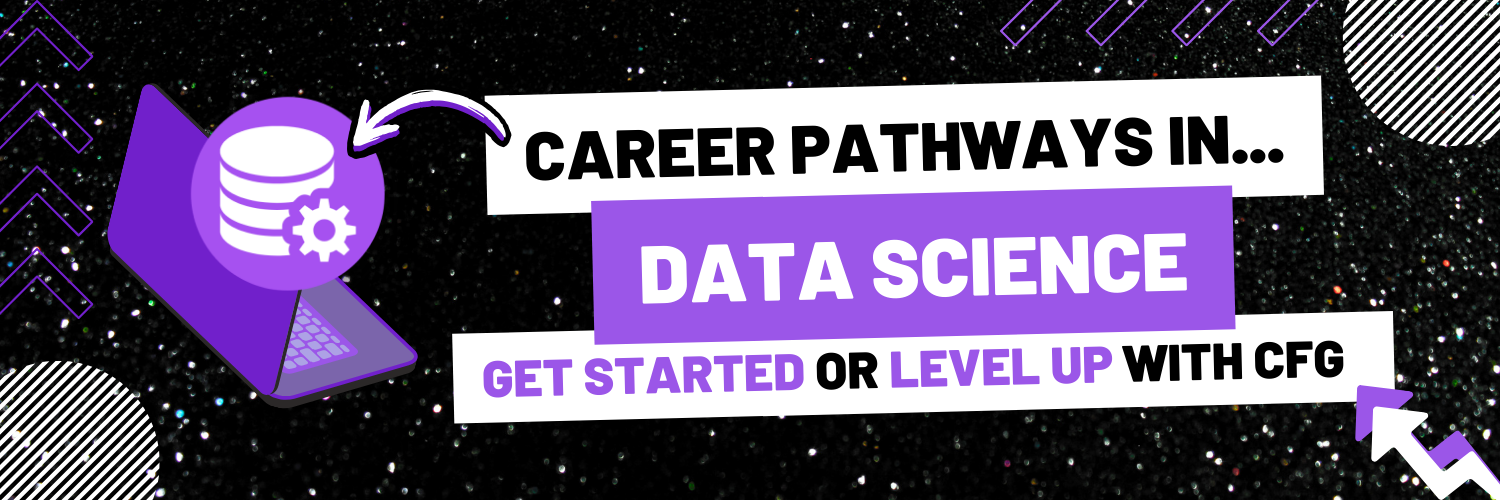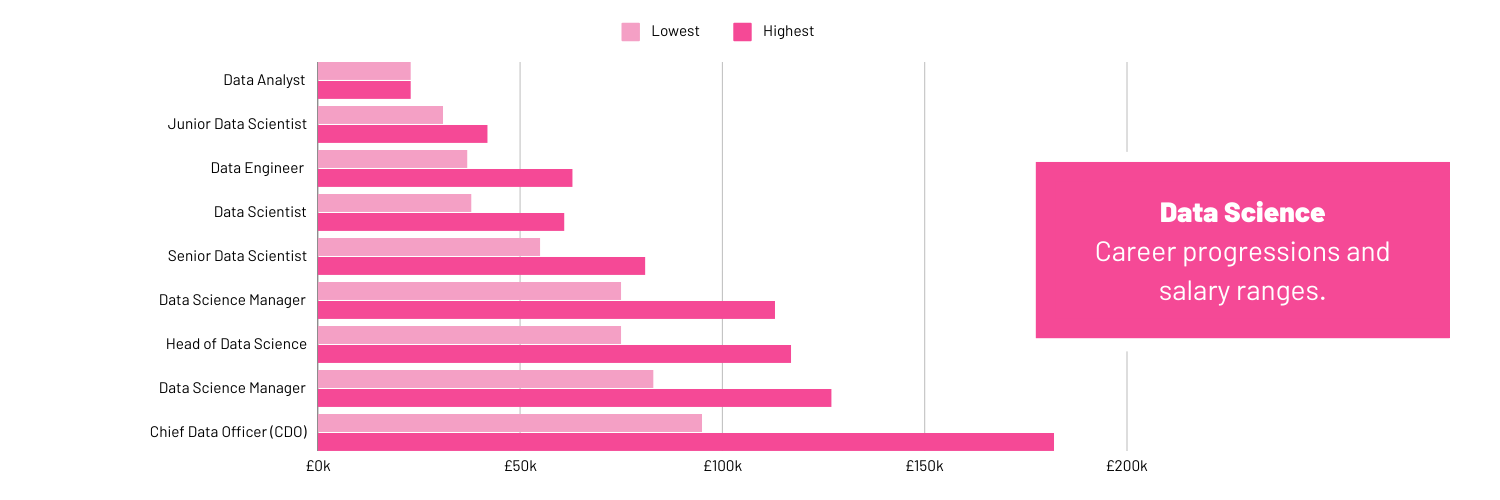
Content Menu
How to start & progress a career in Data Science
WHAT IS A DATA SCIENTIST?
Data Analysts and Data Scientists often work in the same team, but they manage different areas. Whilst a Data Analyst will collect, clean and present data to stakeholders, a Data Scientist will investigate beyond the analysis, usually dealing with more complex and unstructured data sets. 🤯
WHAT DOES A DATA SCIENTIST DO?
✔️ Use Advanced statistical techniques such as machine learning to uncover insights and make data-driven predictions that contribute to the development and innovation of products or services
✔️ Develop algorithms to build predictive models to help solve a variety of intricate business problems
✔️ Interpret and communicate these findings to stakeholders in a way that is clear and understandable to different audiences
✔️ Produce data visualisations and dashboards to facilitate understanding of data. While ensuring data privacy and security standards are maintained throughout the process
Like with many tech roles, a curiosity to keep learning new skills and stay up to date with industry trends is a good way to stay on top of new opportunities, whilst gaining practical experience in the field to develop upwards in this career. This may include learning the following:
- Natural language processing 💬
- Computer vision 💻
- Deep learning 💽
TYPES OF JOB ROLES IN DATA SCIENCE
The awesome part about data science is there are many types of roles to get involved with that can suit your strengths and interests. Here, we reflect on a few different levels of expertise, specialisations, and responsibilities that branch out from the role of data scientist:
Data Scientist: Utilises advanced statistical and machine learning techniques to analyse and interpret complex data sets, often for predictive modelling.
Research Scientist: Conducts research using data to drive innovation and contribute to the development of new technologies.
Quantitative Analyst: Applies mathematical and statistical methods of financial and risk-related data for decision-making in finance.
Machine Learning Engineer: Specialises in designing and implementing machine learning algorithms and models.
Deep Learning Engineer: Focuses on developing deep learning models, a subset of machine learning, often applied to complex tasks like image and speech recognition.
Computer Vision Engineer: Specialises in developing algorithms and models for computer vision applications, such as image and video analysis.
Natural Language Processing (NLP) Engineer: Works on applications that involve processing and understanding human language using computational techniques.
AI Engineer: Generalised role working on various aspects of artificial intelligence, including machine learning, natural language processing, and computer vision.
Data Engineer: Focuses on designing and maintaining the architecture for collecting, storing, and processing large volumes of data.
Data Architect: Designs the overall structure and organisation of data systems to ensure scalability and efficiency.
Data Science career progression and salaries
The Data Science career pathway typically follows a linear progression starting with entry-level roles and then moving up to positions with more responsibilities as your expertise grows. Here we explore an overview of a typical career path in data science, but these can also differ depending on the company, industry and location of work.
According to statistics taken from Glassdoor (as of 2024) the average salary ranges for these roles in the UK are
ENTRY LEVEL ROLES:
- Data Analyst: £23k – £23kp/year
- Junior Data Scientist: £31k – £42k p/year
- Data Engineer: £37k – £63k p/year
MID-LEVEL TO SENIOR ROLES:
- ⭐Data Scientist:£38k – £61k p/year
- Senior Data Scientist: £55k – £81k p/year
- Data Science Manager: £75k – £113k p/year
EXECUTIVE LEVEL ROLES:
- Head of Data Science: £75k – £117k p/year
- Data Science Director:£83k – £127k p/year
- Chief Data Officer (CDO): £95k – £182k p/year

ENTRY LEVEL ROLES IN DATA SCIENCE
Data Analyst
Many Data Scientists begin in an analyst position which involves data collection, cleaning, and analysis to produce insights for the organisation.
Data Engineer
Focuses on designing, constructing, and maintaining the systems and architecture for data generation and storage.
Junior Data Scientist
Works on basic data analysis tasks, model building, and experimentation, and usually may be under the guidance of senior data team members.
MID TO SENIOR-LEVEL ROLES IN DATA SCIENCE
⭐Data Scientist
Mainly carries out in-depth analysis of data found by the Analysts, then builds predictive models (i.e. machine learning), and develops algorithms to solve more specific business problems.
Machine Learning Engineer
This team may specialise in designing, implementing, and deploying machine learning models at scale to the data.
Data Product Manager
Leans more into Product Management – but is specifically focused on managing the development of data-driven products and features, liaising between technical and business teams.
Senior Data Scientist
This senior role involves leading complex data science projects and providing strategic guidance on data-driven initiatives. As well as, often mentoring junior team members.
Principal Data Scientist
Provides thought leadership in data science, contributes to high-level strategic decisions, and sets the technical direction for the team.
Data Science Manager/Director
Oversees a team of data scientists, sets priorities, allocates resources, and ensures the successful execution of projects aligned with business objectives.
EXECUTIVE LEVEL ROLES IN DATA SCIENCE
Chief Data Officer (CDO)
Defines the organisation’s overall data strategy, manages data governance, and ensures that data initiatives align with business goals.
Vice President of Data Science
Leads the data science function within the organisation, drives innovation and collaborates with other executives to shape the company’s strategic direction.
BECOME A DATA SCIENTIST WITH CODE FIRST GIRLS
If you’re looking to develop your coding skills for a career in data science, then our following ‘Intro to…’ Tech Tasters and Challenges will equip you with the knowledge to get started.
Our Kickstarter Classes are perfect for both developing and seasoned coders to learn more about specific tech topics in more depth. These classes run over eight weeks and also allow you to take on a mini-coding project at the end. For a career in Data Science, we recommend this class:
After developing your data knowledge skills with our Tech Tasters and Classes, you’ll be able to expand this further with our Data Engineering CFGdegree course which will prepare you for a career as a Data Analyst / Data Scientist / Data Engineer / Data Architect, and more.
For those with 2 years of experience, our Mid-Level Accelerator has been specially designed to help women move from Junior or entry-level developer roles into mid-level roles in tech. The course will help all candidates boost their soft skills to boost what is known as “developer velocity’ and will develop their tech skills across a modern software development lifecycle.
DATA SCIENTISTS IN OTHER INDUSTRIES

Finance Industry
Data Scientists in the finance industry usually develop predictive models for risk assessment, fraud detection, and investment strategies such as those used in online banking. As well as advanced statistical and machine learning techniques to analyse complex financial data – such as trends and patterns in the stock market.

Healthcare Industry
Data Scientists in the healthcare industry may use their data expertise to improve patient outcomes, streamline operations, analyse electronic health records and more. They may also be involved with clinical trials and safeguard compliance with regulatory requirements that support evidence-based decision-making and enhance healthcare delivery.
CONCLUSION
Data Science is a fulfilling role for people who like digging deeper into complex structures of data, as well as discovering new insights and problem-solving. This tech pathway seeks effective communicators who also have a hunger for new learning and growth opportunities as they progress in their careers, whilst exploring the rich world of data that can be found across many industries and specialisations.
HOW THE NATIONAL GRID USE DATA SCIENCE TO BECOME CARBON-NEUTRAL
IN OUR #REPRESENT EPISODE WITH SARAH MILTON HUNT
Sarah talks about how data will be used to ask the right questions that can help us develop more efficient and effective ways to create solutions such as saving energy and finding more ways to become carbon neutral on our global journey to reach net zero.
